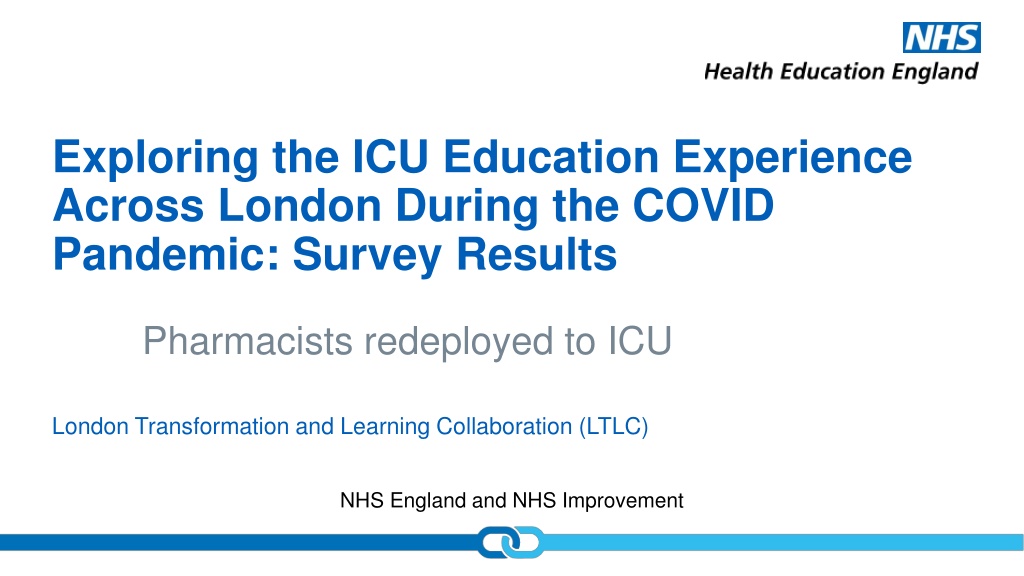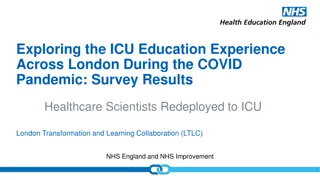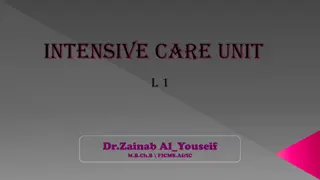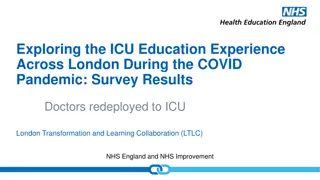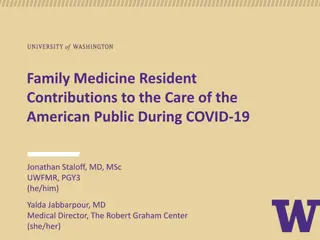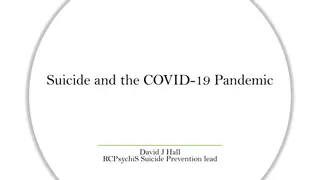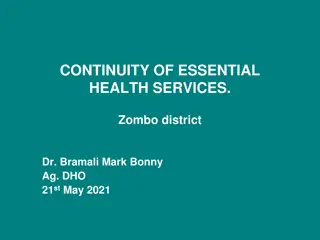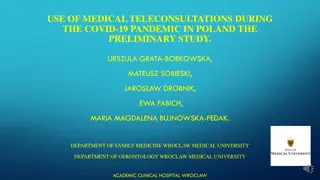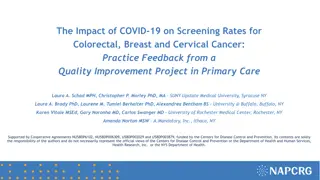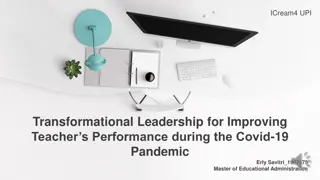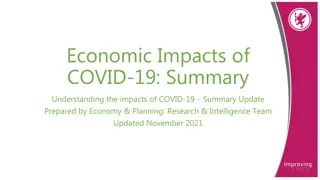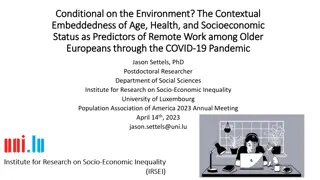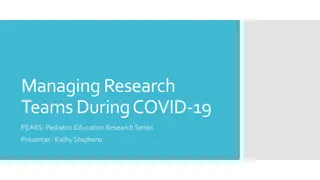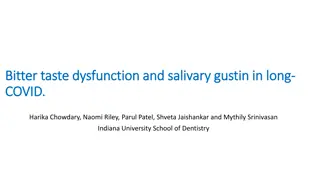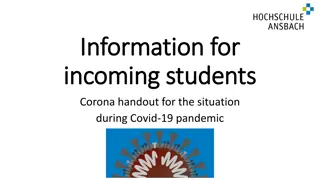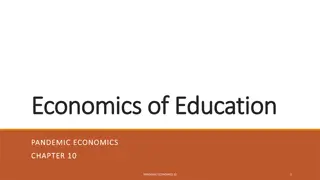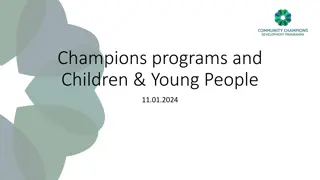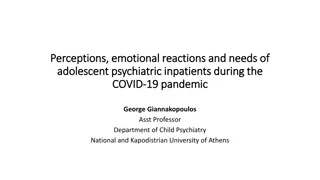Education Experience in London ICUs During COVID Pandemic
Survey results from pharmacists redeployed to ICUs in London reveal the London Transformation & Learning Collaborative (LTLC) aims to enhance staff readiness and patient outcomes. The LTLC programme focuses on expanding critical care capacity, developing training programmes, and fostering collaboration to navigate the challenges posed by the pandemic.
Download Presentation

Please find below an Image/Link to download the presentation.
The content on the website is provided AS IS for your information and personal use only. It may not be sold, licensed, or shared on other websites without obtaining consent from the author. Download presentation by click this link. If you encounter any issues during the download, it is possible that the publisher has removed the file from their server.
E N D
Presentation Transcript
Exploring the ICU Education Experience Across London During the COVID Pandemic: Survey Results Pharmacists redeployed to ICU London Transformation and Learning Collaboration (LTLC) NHS England and NHS Improvement
Purpose of the London Transformation & Learning Collaborative (LTLC) We want to assist system working and move forward in a way that will support growth and optimise effectiveness. Work collaboratively Share best practice across organisations, systems and the region Enable colleagues to be more prepared to work in an expanded critical care as well as in the event of a second surge thereby improving staff experience Support each other in improving patient outcomes Providing training content and structure that can be delivered consistently and effectively | 2
About the LTLC Programme: Purpose To increase the supply and resilience of staffing for critical care across London To develop a London plan that seeks to ensure that the NHS workforce is equipped with the skills and capabilities to manage existing demand, potential future spikes in demand as a result of Covid-19 and longer-term permanent expansion of critical care capacity in London. Primary outcome To cross-skill staff to support the London region to expand ICU capacity with the potential to open more critical care beds in surge Scope Develop clinical education transformation capability across the NHS in London: Develop transformation programmes which align to patient need, service model, and workforce models. Co-ordinate design and delivery of training to support London s response to Covid-19: Establish innovative education delivery models that will support the development of an agile workforce that has the robust capability to deal with a second surge. | 3
Survey Aims and Research Questions Aim: Explore education experiences of those who worked in ICUs across London during the COVID pandemic; both those who worked in ICU and those who were redeployed to ICU Research Questions: 1 2 3 ICU staff receiving education Demographics Useful elements of training Elements of preparation that were missing What would you do differently? ICU staff delivering education Non-ICU/Redeployed staff Useful elements of training Training that was missing Useful things learnt (how and from who) Steepest learning curve (how it was overcome) Training resources used What would you do differently? Advice to a colleague going to work in ICU Demographics Education successes Education challenges Useful professional groups Support needed for a second surge Would collaborating with other ICUs help? Training resources and IT systems used 179 responses 138 responses 616 responses | 4 Total = 933 responses
Survey Results: Reponses from Pharmacists that were redeployed to ICU during the pandemic Total = 47 Responses *Resources that were suggested in the survey responses are being collated separately and are not discussed in this summary | 5
Redeployed Pharmacists: Level and Location Response Rates by Area of London Banding No South West Band 5 Band 6 Band 7 Band 8A Band 8B Band 8C Band 9 Total 3 2 10 19 10 2 1 47 North Central South East North West North East | 6
Q1: During the initial COVID response what was the most useful and important elements of training you received? ICU Skills and Knowledge General Pharmacy specific knowledge 16 Support from other pharmacists 17 Sedation 4 Introduction/cross-skilling course 9 PPE 3 Shadowing in ICU 9 COVID knowledge 2 Online resources 8 Filtration/renal replacement 2 Pharmacy organisations 8 Infusions 2 Drug shortages and procurement 3 Ventilation 2 Trust guidelines 3 | 7
Discussion Q1: During the initial COVID response what was the most useful and important elements of training you received? Pharmacy related knowledge was the most common response, such as drugs and dosing common drugs seen in CC and how to screen these Redeployed pharmacist NWL Other elements of training that pharmacists deemed most useful were: sedation, PPE, COVID knowledge, filtration, infusions and ventilation Support from other pharmacists (such as lead pharmacists and ICU pharmacists) and cross-skilling or introductory ICU courses were very useful Some discussed how hands-on training and shadowing pharmacists within ICU was how most learning took place shadowing pharmacists and applying training to actual patients Redeployed pharmacist NWL RPS and UKCPA provided several resources that pharmacists mentioned as useful | 8
Q2: What do you wish you had known more about / had more specific training before you worked in CC? ICU Skills and Knowledge Other ICU medications 9 Nothing 7 Delirium 5 Orientation to ward, role and team structure 7 Ventilation 4 Equipment 3 Circulatory Support 4 Shadowing/Hands-on training 3 ARDS / respiratory failure 3 Ordering medications 2 Filtration/ renal replacement 3 Introduction to ward staff 2 Clinical trial selection 2 Managing stock shortages 2 COVID knowledge 2 Guidelines 1 Anticoagulation 1 Computer systems 1 PPE 1 More training 1 | 9
Discussion Q2: What do you wish you had known more about/ had more specific training before you worked in CC? Many pharmacists said that no additional training that was needed Elements of training felt to be lacking were: ICU medications (including sedation), delirium, ventilation, circulatory support, ARDS/respiratory failure and filtration In relation to ICU medications, some felt that there wasn t enough time to develop familiarity with medications that they do not normally see that were being given to patients with abnormal parameters Half a day training/refresher is not sufficient to build confidence in practice no matter how high your banding is. Having to refresh on IVs that are predominantly given in CC would have been a lot more helpful it was ongoing training Redeployed pharmacist List of alternative medications for basic ITU drugs - to be used in case of stock shortages Redeployed pharmacist Orientation to the ward, team and the role was a common theme and was felt to be lacking More an intro to permanent staff on ITU: I was new to them, they were new to new, but everyone was so busy that often I was never introduced properly Redeployed pharmacist | 10
Q3. What were the most useful things you learnt whilst looking after patients in CC?* Who did you learn this from and how? From Who Useful Things Learnt ICU pharmacy team Other staff members Doctors Nurses Wellbeing team 27 7 4 3 1 Patient assessment Sedation Teamwork/communication ICU drugs COVID knowledge Anticoagulation Ventilation Drug shortages Cardiovascular support Filtration/renal replacement Proning Infusions 10 6 6 5 5 4 4 3 3 2 2 1 How Shadowing Huddles Teaching sessions Self-directed study Ward round Microsoft teams 8 3 2 2 2 1 | 11
Discussion Q3: What were the most useful things you learnt whilst looking after patient in CC? Who did you learn this from and how? It was felt that learning how to carry out a patient assessments in ICU was useful and some mentioned Mnemonics such as FLATCHUGs, RAAS and the A-E assessment ICU drugs, particularly those relating to sedation and anticoagulation, were felt to be useful knowledge learnt on ICU Non-technical skills including communication and teamwork were useful skills learned The ICU pharmacy team were the greatest source on knowledge for redeployed pharmacists mainly whilst shadowing, although many commented on the importance of other staff members | 12
Q4a: What were the steepest learning curves you faced on redeployment? How did you overcome them? Skills and Knowledge Other How were they overcome Internet including apps Colleague support ICU pharmacists Books/literature Intranet/local guidelines Support from trust Induction Clinical trial team Self-care 21 20 15 7 3 3 2 1 1 ICU Drugs/drug formulation 9 New Environment/role PPE and infection control Drug shortages/substitutes Patient assessment Clinical trials 11 9 6 3 3 1 6 Psychological stress 5 Workload 5 Working with non-ICU staff 2 Physical stress Working as MDT | 13
DiscussionQ4: What were the steepest learning curves you faced on redeployment? How did you overcome them? ICU drugs and drug formulations were a common response, along with PPE, drug shortages and patient assessment The lack of knowledge about the new working environment and the new role was commonly discussed including where things were, how a shift worked and how the ICU team was structured Coping with psychological and physical stress were steep learning curves for many o Physical stress included fatigue, dehydration and wearing PPE Colleagues, mainly ICU pharmacists, were crucial to managing the steep learning curves Additional training that people undertook was often online knowledge base of the drugs used, infusion rates, various routes of administrations. how to get the information required Redeployed Pharmacist The procurement of medications. I had to predict usage and apply this to our orders. Finding out alternatives for medications that were no longer available in the supply chain Redeployed Pharmacist getting to grips with drugs that prior to ITU exposure i had never come across before Redeployed Pharmacist | 14
Q5: What would you do differently if you had to go back to your initial redeployment? Many pharmacists mentioned that they would like more training and many discussed they would have done more self-directed learning Spending in time in ICU before starting redeployment was considered important Some say they would not do anything differently and some that they would be more positive about the experience Some commented that they would like to see better teamwork and communication Responses No. More training More self-directed study Supernumerary/shadowing in ICU Nothing Be more confident Improve teamwork/communication Better self-care Discuss with colleagues more Attend ward rounds 7 7 7 5 4 4 2 2 2 I would be optimistic and familiarise myself with all the relevant information. I would also get more training and insight to the unit before start working Redeployed pharmacist I would take time to talk to my colleagues more. I would engage with psych support-talking therapies more and not bring my worries home with me Redeployed pharmacist Ideally, be able to spend more time with ITU pharmacist in training as this was the most useful aspect to put theory into practice Redeployed pharmacist | 15
Q6: What is the one piece of advice you would give a colleague going to work on CC? Responses No. Not being afraid to ask questions or for help was the most common advice Improving knowledge before and during redeployment was commonly advised Getting involved with the MDT including attending ward round was a theme Better psychological and physical care was mentioned Ask questions/for help Improve knowledge Get involved with MDT Be systematic Better psychological care Ensure sufficient training Consider basics Better physical care 14 12 8 6 5 5 4 3 It can be overwhelming but make sure you do your research before and ask for help to aid your learning throughout! Redeployed pharmacist 80% of the things you initially think are scary are actually the medications/conditions that you work with day to day and they become familiar very quickly - and failing that you just have to take it back to first principles and work through Redeployed pharmacist | 16
Conclusions: The most important elements missing from training were: ICU medications, delirium, ventilation, circulatory support, ARDS/respiratory failure and filtration In relation to ICU medications, some felt that they were not given sufficient training on ICU drugs including sedation, anticoagulation and drug shortages Support from other pharmacists (including lead pharmacists and ICU pharmacists) was seen as a very important part of training It was commonly mentioned that hands-on training and shadowing/supernumerary days within ICU prior to redeployment was important There was a lack of local induction and orientation to the ward as well as role expectation prior to redeployment Coping with psychological and physical stress were steep learning curves It was felt that learning how to carry out a patient assessments in ICU was valuable with many commenting how going on the ward round was a crucial part of learning | 17
The LTLC: Education Workstream The LTLC are using these survey results (as well as focus groups) to inform the following: Support role definition Share Education Content Create a Skills Passport Publish a skills matrix mapped to existing competency frameworks for all critical care roles Curate existing high quality education content into modules mapped to the skills matrix Create electronic competency passports, interfacing with IT systems, e-learning and face to face education This can be used locally to inform learning objectives and avoid over-teaching Specific areas include: Leadership training Teamworking Wellbeing ICU equipment Explore compatibility with e- rostering platforms | 18
